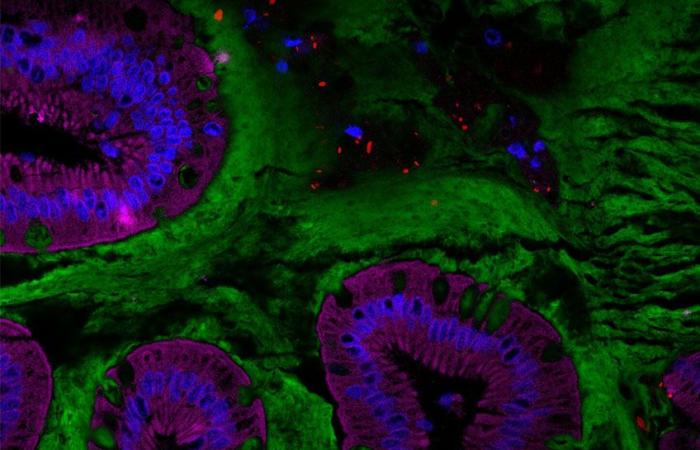Visualization of the human intestinal microbiota (red) within the mucus layer (green) located on the surface of the intestine. © Benoit Chassaing/Institut Cochin
On the occasion of World Microbiome Day, Inserm invites you to rediscover some of its contents, as well as the latest news from Food Systems, Microbiomes and Health research program, that the Institute co-pilots with INRAE.
Microbiomes are ecosystems in which microorganisms such as bacteria, viruses, parasites and fungi coexist, which live in symbiosis with their host in a given environment. The constitution and composition of these microbiomes is specific to each individual and evolves throughout life.
We speak of microbiota when these microorganisms coexist in the same place, for example in the intestines, in the vagina or in the mouth.
Over the last decade, numerous research studies have shown that the balance of the microbiome, and therefore the number and diversity of microorganisms present in our body, is essential to the health of individuals. An imbalance (scientifically called “dysbiosis”) can be the cause of the development of chronic diseases such as inflammatory bowel disease (IBD), but also obesity, and implicated in neurodegenerative, neuropsychiatric and neurobehavioral disorders. .
Factors such as diet, lifestyle, exposure to pollutants, etc. have been mentioned as factors that may be at the origin of microbiome disruptions. However, despite the major scientific advances already made, it is necessary to continue to explore the role of these factors and the associated mechanisms given the complexity of our organism.
At Inserm, several teams are working on the subject and are trying to determine the factors triggering the transition from a “healthy” microbiome to a “dysbiosis” state. The theme also benefited from a new lease of life in 2023, when Inserm was entrusted with co-piloting the Food Systems, Microbiomes and Health research program, with INRAE.
The Food Systems, Microbiomes and Health Research Program
The ambition of the Research Program is to contribute to preventing and treating chronic inflammatory diseases and moving towards personalized medicine through the environment-microbiomes-health triptych and to contribute to the design and evaluation of public policies in terms of food consumption and behavior.
This Research Program with 58 million euros in aid from the French State “France 2030” deployed over 7 years, aims to finance structuring and multidisciplinary research projects to achieve a leading role at the national level. and international.
All program news is available on its website. class>
To go further on the microbiome:
- Consult the recent news published on the Inserm website:






